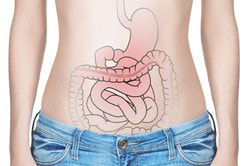Support your intestinal health.


The liver is extremely robust. It still keeps the blood values in balance even when it is already damaged – which is not uncommon at all. Although it is known that alcohol can damage the liver, few people know that also the wrong diet can cause liver diseases. Especially the high amount of carbohydrates (sugars) from snacks, fast food, white flour and ready-made meals rich in calories affect the liver. The liver transforms excess sugar to fat and carefully stores it as reserves for bad times – directly next to the excess of food fats. If the liver receives new supplies every day over a longer period and the calories are not consumed by exercise, the blood does not report a need and the reserves in the liver become a continuously growing permanent reserve. The organ becomes fatty. Nearly a quarter of adults in Germany suffer from fatty liver. Among highly obese and diabetic persons around 85% are affected. And every third overweight child already carries the risk of a fatty liver.
The liver suffers secretly. Affected people maybe have a mild feeling of pressure in the right upper abdomen, rarely pain. The fats, however, settle in and between the liver cells, enclose the organ and more and more impede the functions. Exceeding blood sugar levels increase the risk of diabetes mellitus.
If the liver does not succeed any more in breaking down and processing excess blood sugar, blood fat and also medicaments and alcohol, a backlog is the consequence. The substances accumulate and cause inflammations and hepatitis. A fatty liver can recover by a change of the way of living, but normally not hepatitis. In the long run, liver cirrhosis can be the consequence, which means that damaged liver cells are replaced by useless connective tissue cells.
Alcohol is one reason. If the enzymes, which normally disintegrate the cytotoxin completely, are affected by too much alcohol or the unbalanced metabolism of the fatty liver, fatty acids accumulate as intermediate product, filling up the liver's fat depots. Too much alcohol has then an accelerant effect. Men should not drink more than 400 ml wine or 800 ml beer daily, women only half of it. The best thing is not to drink alcohol at all, or only at special occasions, so that the liver can recover sufficiently in between.
Support the liver with these three tips: